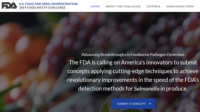FDA, Industry Square Off over Use of Wooden Boards in Artisanal Cheesemaking

Last week, after a letter from an U.S. Food and Drug Administration (FDA) official stating that the use of wooden shelves for cheese ripening "does not conform to cGMP requirements" went public, cheesemakers passionately defended the age-old practice. Then on June 11, the FDA clarified that it does not intend to ban wooden boards from being used in cheesemaking.
It is unclear why the firestorm was just ignited last week, given that in its clarification, the FDA noted that, "At issue is a January 2014 communication from the agency’s Center for Food Safety and Applied Nutrition (CFSAN) to the New York State Department of Agriculture and Markets’ Division of Milk Control and Dairy Services, which was sent in response to questions from New York State." However, it is clear that what upset the artisan cheese community was the following paragraph from Metz's letter:
The use of wooden shelves, rough or otherwise, for cheese ripening does not conform to cGMP requirements, which require that “all plant equipment and utensils shall be so designed and of such material and workmanship as to be adequately cleanable, and shall be properly maintained.” 21 CFR 110.40(a). Wooden shelves or boards cannot be adequately cleaned and sanitized. The porous structure of wood enables it to absorb and retain bacteria, therefore bacteria generally colonize not only the surface but also the inside layers of wood. The shelves or boards used for aging make direct contact with finished products; hence they could be a potential source of pathogenic microorganisms in the finished products.
According to National Public Radio's "The Salt" blog and Professor Marion Nestle's "Food Politics" blog, there are valid concerns on both sides of the debate. The two blogs suggested that small, artisan cheesemakers have for years felt persecuted or hyper-scrutinized by the FDA. The blogs also noted that the FDA has reason to worry about the potential for wooden boards to harbor dangerous pathogens such as Listeria.
"The Salt" blogger April Fulton spoke with former FDA official David Acheson, and the following paragraphs about that interview provide a snapshot of the debate's complexity:
"Wood is hard to clean – that's why they don't allow wooden pallets for some things," former FDA food safety chief tells The Salt. And wooden cutting boards? They are not allowed in commercial food service prep, although there are many methods home cooks swear by, including with diluted vinegar or bleach.
As for the cheese aging boards, "There's no question there's a risk," Acheson says, but the question is, how much. "I'm not aware of any evidence that the wooden boards on which cheese is aged led to listeria outbreaks," he says.
Although it's not the first time FDA has picked a — mimolette, anyone? — this time, "it really put a rocket under the cheese industry," he says.
For its part, the FDA appears to be trying to dial down the anxiety and invite cheesemakers to continue the dialogue constructively. In the Agency's June 11 CFSAN Constituent Update, FDA officials said:
The FDA recognizes that this communication has prompted concerns in the artisanal cheesemaking community. The communication was not intended as an official policy statement, but was provided as background information on the use of wooden shelving for aging cheeses and as an analysis of related scientific publications. Further, we recognize that the language used in this communication may have appeared more definitive than it should have, in light of the agency’s actual practices on this issue.
The FDA has taken enforcement action in some situations where we have found the presence of Listeria monocytogenes at facilities that used such shelving. Since 2010, FDA inspections have found Listeria monocytogenes in more than 20 percent of inspections of artisanal cheesemakers. However, the FDA does not have data that directly associates these instances of contamination with the use of wood shelving.
In the interest of public health, the FDA’s current regulations state that utensils and other surfaces that contact food must be “adequately cleanable” and “properly maintained.” Historically, the FDA has expressed concern about whether wood meets this requirement and these concerns have been noted in its inspectional findings. However, the FDA will engage with the artisanal cheesemaking community, state officials and others to learn more about current practices and discuss the safety of aging certain types of cheeses on wooden shelving, as well as to invite stakeholders to share any data or evidence they have gathered related to safety and the use of wood surfaces. We welcome this open dialogue.
Looking for a reprint of this article?
From high-res PDFs to custom plaques, order your copy today!





